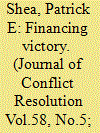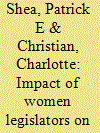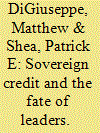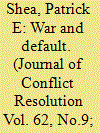|
|
|
Sort Order |
|
|
|
Items / Page
|
|
|
|
|
|
|
| Srl | Item |
| 1 |
ID:
133713


|
|
|
|
|
| Publication |
2014.
|
| Summary/Abstract |
With access to inexpensive credit, states can finance wars without overburdening their constituents, and face relatively small short-term costs compared to states with poor credit access. As a result of these economic benefits, states with lower credit costs will be more likely to win their wars, ceteris paribus. However, lower borrowing costs provide states domestic political benefits, which I argue are more important for democracies than nondemocracies. Since expensive credit forces states to rely on its citizens for revenue, governments that are more sensitive to their citizens' preferences are at a disadvantage. In sum, I argue that democracies are more sensitive to credit costs than authoritarian regimes. To test this theory, this article analyzes a data set of wars using logistic regressions and matching techniques, and examines the case of the Chaco War. The results demonstrate that the costs of borrowing have a substantial effect on war outcomes, and that these costs are more important for democracies than nondemocracies.
|
|
|
|
|
|
|
|
|
|
|
|
|
|
|
|
| 2 |
ID:
156534


|
|
|
|
|
| Summary/Abstract |
In this article, we contend that the current gender and conflict literature ignores the context of military decisions and thus underestimates the support of women for certain types of military interventions. We argue that the issues related to humanitarian crises are likely to provoke support from women. Consequently, as more women enter elected positions in state legislatures, the more likely a state will become involved in a humanitarian military intervention. To test our argument, we compile a data set of humanitarian military interventions and women legislators from 1946 to 2003. A series of estimation approaches and robustness tests support our assertion that more women legislators impact the likelihood that a state will become involved in a humanitarian military intervention. Our research has specific implications on the role of gender in conflict processes and more general implications on the connection between domestic political processes and foreign policy decision making.
|
|
|
|
|
|
|
|
|
|
|
|
|
|
|
|
| 3 |
ID:
141853


|
|
|
|
|
| Summary/Abstract |
In this article, we contend that the “democratic advantage” literature (i) exaggerates the potential political backlash from credit downgrades in democracies; and (ii) overlooks the importance of sovereign credit to nondemocratic leaders. We argue that nondemocratic regimes receive a higher marginal political benefit from credit compared to democratic regimes. Consequently, changes in credit prices or credit access affect nondemocratic leaders' tenure more than democratic leaders' tenure. To test this argument, we provide the first statistical examination of the electoral punishment mechanism of the “democratic advantage.” Our duration analysis shows that credit downgrades increase nondemocratic leaders' vulnerability more than that of their democratic peers. Our research reinforces the growing concerns about the conventional views about regime type, domestic constraints, and leaders' preferences toward sovereign credit and other political processes.
|
|
|
|
|
|
|
|
|
|
|
|
|
|
|
|
| 4 |
ID:
161602


|
|
|
|
|
| Summary/Abstract |
Sovereign borrowing is often used to cover the costs of war. This borrowing, coupled with war’s economic disruptions, strains states’ ability to honor debt promises. Contrary to conventional expectations, however, we find that default is not common after wars. To explain the relationship between war and sovereign default, this article lays out a selection effect argument: war participants are unlikely to default in the first place, while states likely to default are unable to acquire the financing necessary to fight a war. In sum, states that lack the financial means to adequately borrow avoid paths to war. After offering some examples of the selection mechanism at work, we present evidence that states unlikely to default will avoid entering the war sample. Our findings have implications for the inferences researchers make about war finance and war onset.
|
|
|
|
|
|
|
|
|
|
|
|
|
|
|
|
|
|
|
|
|